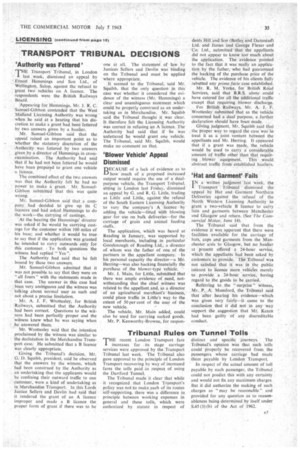'Blower Vehicle' Appeal Dismissed
Page 37

If you've noticed an error in this article please click here to report it so we can fix it.
BECAUSE of a lack of evidence as to how much of a proposed increased output would require the use of a dualpurpose vehicle, the Transport Tribunal. sitting in London last Friday, dismissed an appeal by G. and R. G. Little, trading as Little and Little, against the refusal of the South Eastern Licensing Authority to vary the company's A licence by adding the vehicle—fitted with blowing gear for use on bulk deliveries—for the carriage of grain and animal feeding stuffs.
The application, which was heard at Reading in January, was supported by local merchants, including in particular Goodenough of Reading Ltd., a director of whom was the father of one of the partners in the appellant company. In his personal capacity the director—a Mr. Herring—was also backing financially the purchase of the blower-type vehicle.
Mr. .I. Main, for Little, submitted that there was ample evidence of need, notwithstanding that the chief witness was related to the appellant and, as a director of an agricultural merchant's business, could place traffic in Little's way to the extent of 50 per cent of the user of the new vehicle.
The vehicle, Mr. Main added, could also be used for carrying sacked goods. Mr. P. Kenworthy-Browne, for respon
dents Hill and Son (Botley and Danmead) Ltd. and James and George Hexer and Co. Ltd., submitted that the appellants did not appear to know too much ablaut the application. The evidence pointed to the fact that it was really an application by the father, who had guaranteed the backing of the purchase price of the vehicle. The evidence of his clients fully rebutted any prima facie case established.
Mr. R. M. Yorke, for British Road Services, said that B.R.S. alone could have catered• for all the additional traffic except that requiring blower discharge.
For British Railways, Mr. A. J.• F. Wrottesley submitted that as the vehicle concerned had a dual purpose, a further declaration should have been made.
Giving judgment, Mr. Squibb said that the proper way to regard the case was lo treat it as a joint venture between the appellants and Mr. Herring. It appeared that if a grant was made, the vehicle would be used to carry a' considerable amount of traffic other than that requiring blower equipment. This would abstract traffic from established hauliers.












































































































